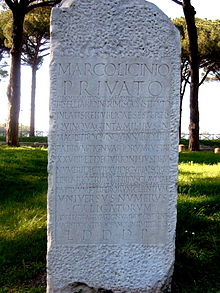Collegium (ancient Rome)

A collegium (plural collegia, "joined together"; English "college") was any association in ancient Rome with a legal personality. Such associations had various functions.
Collegia could function as guilds, social clubs, or burial societies; in practice, in ancient Rome, they sometimes became organized bodies of local businessmen and even criminals, who ran the mercantile/criminal activities in a given urban region, or rione. The organization of a collegium was often modeled on that of civic governing bodies, the Senate of Rome being the epitome. The meeting hall was often known as the curia, the same term as that applied to that of the Roman Senate.
By law, only three people were required in order to create a legal collegium;[citation needed] the only exception was the college of consuls, which included only the two consuls.
There were four great religious colleges (quattuor amplissima collegia) of Roman priests, in descending order of importance:
- Pontifices (also known as College of Pontifices), headed by the Pontifex Maximus,
- Augures,
- Quindecimviri,
- Epulones.
See also
External links
 Media related to Ancient Roman collegia at Wikimedia Commons
Media related to Ancient Roman collegia at Wikimedia Commons
